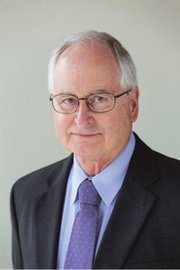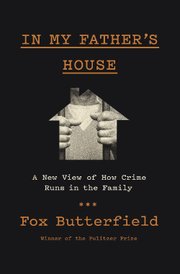Fox Butterfield, the Pulitzer Prize-winning former New York Times reporter, makes the observation in his just-published book In My Father's House: A New View of How Crime Runs in the Family (Knopf, $26.95) that about 5 percent of families are responsible for 50 percent of crime in the U.S.
It takes a moment to realize that might be true. Maybe we're so used to looking at crime through the prisms of drugs and race that we haven't considered it being passed down from generation to generation, a legacy like the expectation of going to law or medical school.
At its best My Father's House reads like fiction; it's a fascinating serial biography of various members of the blighted Bogle clan, the extended poor white family in which Butterfield finds 60 felons -- drug dealers and kidnappers, car thieves and burglars and at least one murderer. It's a story that unfolds in Tennessee, in Paris, Texas, and in Oregon, and spans decades. Real-life counterparts to Erskine Caldwell's fictional Lesters in Tobacco Road or the Ewells who live by the garbage dump in To Kill a Mockingbird, the Bogles are part of a permanent underclass that accepts criminality as inevitable. And Butterfield argues they are not atypical.
He may be right.
It seems reasonable to assume a relatively small percentage of the population in general is responsible for the overwhelming majority of crime and, that since the children of criminals would seem to be at significantly higher risk of becoming criminals themselves, maybe Butterfield's figures are close to correct. A little research suggests he's in the ballpark.
Back in 2014, Texas Gov. Dan Patrick alleged that "100 percent of the crime is committed, in estimate, by about 15 percent of the population." Politifact investigated that claim and "found nothing to back it up." In the course of its investigation, the reporters interviewed Alex Piquero, a criminologist at the University of Texas at Dallas, who told them by email "[a]routine finding in the criminological literature is that about half of the crime is committed by a very small fraction of the population, around 5-8 percent depending on the sample and methodology used. This finding has been replicated in many different studies around the world."
"Rooster Bogle not only took his children out to commit crimes with him; he even happily prophesied where this would lead them," Butterfield writes. "Some days he would take his boys to a lake southeast of Salem to go fishing, their route taking them past another sprawling prison, the Oregon State Correctional Institution, which was surrounded by mounds of shiny razor wire. Rooster would gaze at the facility with something akin to a perverse nostalgia, as if he were looking at a great castle. On these occasions he liked to tell his oldest son, 'Look carefully, because when you grow up, you guys are going to end up there.'"
The Bogles are, in the main, terrible people who had little chance of integrating into society. (There is a note of uplift at the end, when Butterfield recounts the struggle of the first member of the family to attend college and her parents' mindful decision to protect her from the stunted values of her kinfolk.) Rooster, in particular, is no prize -- he abused his children in myriad ways and celebrated their early ventures into petty crime the way square dads might celebrate good grades and sports trophies. But Butterfield always grants his subjects their humanity -- the Bogles were afflicted by dire poverty, alienated from education and given scant access to resources that might have made a meaningful difference in their lives.
Butterfield occasionally shoehorns in some dry science and social research that detracts from the sprawling narrative (there's a chapter on methods at the end), and he's not exactly a beautiful stylist. I couldn't help but think that the highest and best use of In My Father's House is as a companion volume to All God's Children, the 1995 book Butterfield wrote about Willie Bosket, the notorious youthful murderer whose crimes led to New York changing its laws so juveniles as young as 13 years old could be tried as adults and face the same penalties. Butterfield traces Bosket's family history from their days as slaves in South Carolina to the 1980s to make points about how racism and violence resulted in the incarceration of a disproportionate number of black Americans.
He has found a seam in an uncrackable problem. At the very least we ought to begin to understand this dynamic exists, and sometimes the worst thing for a young offender -- and for society -- is to return them to an environment that accepts criminality as inevitable.
Email:
pmartin@arkansasonline.com
blooddirtangels.com
Style on 10/28/2018

